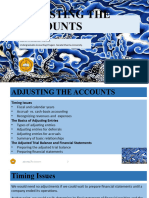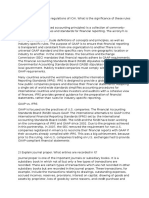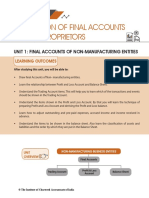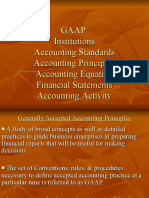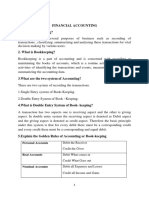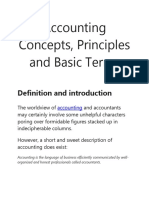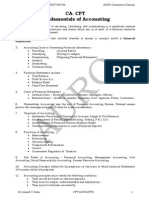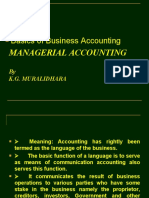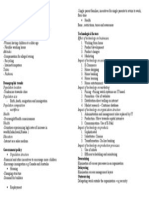Accounting ConceptsJournal
Uploaded by
hoozhoon hoodhoodAccounting ConceptsJournal
Uploaded by
hoozhoon hoodhoodAccounting concepts
These are ideals adopted when preparing accounts and other financial statements. Concept Details Business Entity The business is a separate person from the owner Going concern It is assumed that the business will continue its operation in the foreseeable future unless otherwise mentioned Accounting period Each business must have a definite period of time for preparing its accounts Historical cost All transactions are accounted at values at the date of occurrence Money measurement Only transactions with a monetary value are accounted for Objectivity Items should not reflect personal opinion but rather facts Realisation Transaction should be accounted only on occurrence Materiality Transactions should be treated according to their value impact on the accounts Dual aspect Each transaction has a double effect which has to be accounted Matching/Accruals Income should be matched with the expenses incurred to earn them whether paid or not Consistency Whatever methods or rates have been adopted have to be applied continuously throughout the year and over accounting periods Prudence/Conservatism Profits should not be accounted unless earned and losses should be accounted if foreseen
Journal
A journal or general journal or journal proper is a subsidiary book which records those transactions which are not recorded in the other subsidiary books. A journal is kept as an explanation for such transactions. It has a debit column and a credit column and includes a narration of the transaction. Uses of Journal (i)Adjust opening and closing balances ABC and Co has the following balances at start of 2003 prepare a journal entry to record them in the ledger. $ Motor vehicle 5000 Debtors 7000 Cash 2000 Capital 14000 (ii)Adjust for closing balances ABC and Co has the following closing balances as at 31.12.03.Prepare Journal entries with narrations to adjust them. (a)Closing stock $5000 (b)Insurance due$3000 (iii)Assets bought on credit. Equipment was bought on credit from AGH Ltd on 1 Feb 2004 (iv)Correction of errors
You might also like
- Five Mark Questions & Answer - Financial AccountingNo ratings yetFive Mark Questions & Answer - Financial Accounting12 pages
- 5f334509dc9eb - Acounting Principal by - Nishesh RegmiNo ratings yet5f334509dc9eb - Acounting Principal by - Nishesh Regmi4 pages
- Basics of Accounting: Overview of Hedge FundsNo ratings yetBasics of Accounting: Overview of Hedge Funds12 pages
- Generally Accepted Accounting Principles: Accounting Concepts and ConventionsNo ratings yetGenerally Accepted Accounting Principles: Accounting Concepts and Conventions20 pages
- Adjusting Theaccounts Studyobjectives After Studying This Chapter, You Should Be Able ToNo ratings yetAdjusting Theaccounts Studyobjectives After Studying This Chapter, You Should Be Able To5 pages
- Generally Accepted Accounting Principles (GAAP)No ratings yetGenerally Accepted Accounting Principles (GAAP)20 pages
- Business Transactions and Their Analysis As Applied To The Accounting Cycle of A Service BusinessNo ratings yetBusiness Transactions and Their Analysis As Applied To The Accounting Cycle of A Service Business8 pages
- Audit of Income and Expenditure Account 1.1100% (1)Audit of Income and Expenditure Account 1.127 pages
- Accounting Process and Principles, Financial, Cost and Management Accounting Author University of MumbaiNo ratings yetAccounting Process and Principles, Financial, Cost and Management Accounting Author University of Mumbai339 pages
- Accounting Period Shareholders DividendsNo ratings yetAccounting Period Shareholders Dividends3 pages
- BOOK KEEPING and ACCOUNTING THEORY NOTESNo ratings yetBOOK KEEPING and ACCOUNTING THEORY NOTES9 pages
- Financial Accounting - Want to Become Financial Accountant in 30 Days?From EverandFinancial Accounting - Want to Become Financial Accountant in 30 Days?3.5/5 (2)
- Lexicon of Certified Public Accountant (CPA) Terminology: Lexicon of Tech and Business, #4From EverandLexicon of Certified Public Accountant (CPA) Terminology: Lexicon of Tech and Business, #45/5 (1)
- Your Amazing Itty Bitty® Book of QuickBooks® TerminologyFrom EverandYour Amazing Itty Bitty® Book of QuickBooks® TerminologyNo ratings yet
- Accounting: Things You Should Know (Questions and Answers)From EverandAccounting: Things You Should Know (Questions and Answers)No ratings yet
- Accounting: A Simple Guide to Financial and Managerial Accounting for BeginnersFrom EverandAccounting: A Simple Guide to Financial and Managerial Accounting for BeginnersNo ratings yet
- Social Trends: Social and Technological FactorsNo ratings yetSocial Trends: Social and Technological Factors1 page
- Lesson Plan: Duration Activity Questions/Tasks Resources/RemarksNo ratings yetLesson Plan: Duration Activity Questions/Tasks Resources/Remarks2 pages





